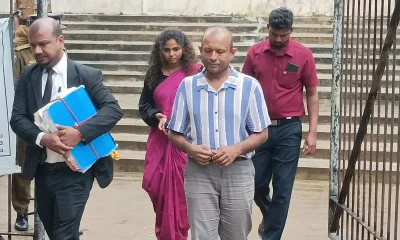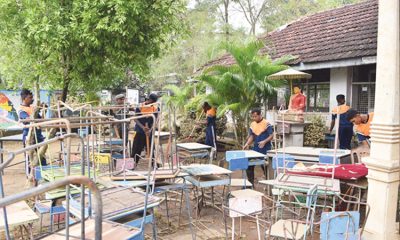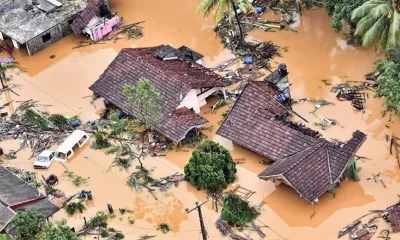Editorial
When heroes cower

Thursday 30th September, 2021
It looks as if a cartel of rice millers were running the country. The government has withdrawn the Gazette that stipulated the much-publicised maximum retail prices (MRPs) of rice, and thereby conceded defeat in its half-hearted fight against the Millers’ Mafia. When it ordered the Consumer Protection Authority (CAA) to conduct raids and seize hoarded paddy/rice stocks, the public may have thought the millers had met their match in the leaders of the current regime, which is full of military veterans in key positions. Alas, the Millers’ Mafia struck back, and the heroes have made a tails-between-legs retreat.
Adding insult to injury, the powerful millers have announced the new retail prices of rice much to the embarrassment of the ruling party toughies who take pride in having defeated the world’s most ruthless terrorist outfit!
The government has threatened to import rice to counter the arrogant millers’ sinister moves. This method is bound to fail; when rice imports arrive, the Millers’ Mafia will release some of its stocks to the market, bringing down the prices of rice. The locally produced rice will sell as it suits Sri Lankans’ palates, and the imported rice will remain unsold in Sathosa warehouses and be disposed as animal feed in the end. This, we have witnessed on numerous occasions. Sathosa is full of thieves, who collude with the wealthy millers, and public funds spent on rice imports will go down the gurgler again.
If the government is really keen to tame the Millers’ Mafia, it should strengthen the small and medium mills and thereby make the paddy and rice markets competitive; they lack the wherewithal to compete with their big counterparts and cannot obtain bank loans before the commencement of the harvesting to purchase paddy because of the skullduggery of the Millers’ Mafia, which sways the banking sector; by the time they receive funds, there is hardly any good quality paddy left for them to buy.
The task of determining the MRPs of rice must be carried out by the state, and not the Millers’ Mafia responsible for exploiting farmers and consumers alike. That is what a government is there for.
Learn from chaos in UK
Fuel pumps have run dry in most parts of the UK, plunging supply lines into utter chaos. Out of sheer desperation, the British government has had to deploy military drivers to operate tankers. The demand for fuel is increasing in the UK, and panic buying rampant. Fuel shortages have left supermarket shelves empty due to supply chain breakdowns, according to media reports.
Sri Lanka ought to learn from the UK’s experience and take steps to avert a similar situation. The fuel crisis in Britain is due to a shortage of drivers to distribute oil. A large number of tanker drivers working in the UK were from the EU countries, especially Romania, and they have left for Germany and France since Brexit.
In Sri Lanka, there is no fuel shortage as such, but rumours are being floated that the government is not in a position to pay for petroleum imports owing to the present forex crunch, and, therefore, the possibility of panic buying cannot be ruled out.
In the UK, there has been panic buying of fuel during the past several days, aggravating the fuel shortage, and there is the danger of Sri Lanka facing such a problem when it fully reopens soon. All it takes to trigger panic buying is a single social media post with a doctored picture of a long line of vehicles near a fuel station.
Fuel pumps, it bears recall, almost ran dry a few weeks ago here after an Opposition trade union leader had warned of an imminent fuel shortage, but an assurance from the government, albeit belatedly, helped bring the situation under control. It may also be recalled that following the X-Press Pearl ship disaster, some social media activists duped the public into panic-buying salt, of all things, causing an unprecedented shortage thereof.
Governor of the Central Bank Ajith Nivard Cabraal has assured the public that the government will release enough funds for fuel imports for the remaining quarter of the current year. Salutary and reassuring as his pledge may be, it is doubtful whether his message has reached the public at large. The government should not only ensure a steady supply of fuel but also seriously consider keeping people informed of the availability of petroleum stocks regularly to keep scaremongers at bay.
Editorial
Bondi Beach and Arugam Bay

Tuesday 16th December, 2025
It was with shock and dismay that the world received the news about Sunday’s cowardly terror attack on a group of Israelis in Australia. Sixteen lives were lost and about 40 others injured in the Bondi Beach mass shooting, which followed an increase in anti-Jewish incidents in Australia after Israel’s invasion of Gaza, where 70,000 Palestinians have perished at the hands of the Israeli military.
Israel has doubtlessly made Hamas regret its 2023 incursion, indiscriminate killings and mass hostage-taking. But the Netanyahu government has incurred much international opprobrium by unleashing disproportionate violence and carrying out attacks on civilian targets. Worse, the Bondi Beach attack has demonstrated the growing vulnerability of Israeli citizens overseas.
Hamas has had to agree to a ceasefire, and faces the prospect of having to disarm. Israel may obliterate Gaza, but victory will still elude it. Hamas may carry out more attacks on Israel, and its sympathisers may target Israeli civilians, but Palestinians will not benefit from such acts of violence. Only peace will benefit the warring sides and civilians. The problem is best tackled at source.
The need of the hour is for the world to strengthen the Gaza ceasefire and make it work by ensuring that both sides refrain from violating it. That is what US President Donald Trump was expected to do. Last month, the United Nations Security Council adopted a US-sponsored resolution that enshrined Trump’s 20-point plan, including the mandate to set up a multinational force for Gaza, but not a single nation has formally committed troops to it yet, according to media reports.
Unfortunately, instead of intensifying his focus on resolving the Gaza conflict and other disputes in keeping with his pre-election pledges, President Trump appears to be busy enacting scenes from Pirates of the Caribbean, hijacking ships and sinking boats off Venezuela, while eying the Nobel Peace Prize, of all things.
Meanwhile, Sri Lanka must keep its guard up. There are Israeli tourists here. In October 2024, the US embassy, followed up by Sri Lankan police and Israel’s National security council, warned of serious terrorist threats to Israelis holidaying in the Arugam Bay area. Thankfully, what was feared did not come to pass, but no room must be left for complacency.
Sri Lanka must take the Bondi Beach attack as a warning and brace itself for any eventuality. A terror attack on its soil is something it needs like a hole in the head while struggling to manage the impact of a natural disaster and keep the economy on track.
The economic cost of the Ditwah disaster has not yet been calculated, but Commissioner General of Essential Services Prabath Chandrakeerthi has given a ballpark figure—USD 6 -7 billion or about 3 – 5 percent of GDP. This is a staggering amount. The economic crisis is far from over. The government has its work cut out to allocate funds for rebuilding programmes and is therefore seeking assistance from other nations. But whether foreign aid will be sufficient for the post-disaster reconstruction projects in all 25 districts, affected by Ditwah, remains to be seen, as we argued in a previous comment. The country is therefore heavily dependent on tourism to shore up its foreign currency reserves. One may recall that the 2019 Easter Terror attacks crippled the tourism sector, and contributed to the forex crisis by depriving the economy of billions of dollars a year.
Sri Lanka cannot take any more shocks, and everything possible must be done to neutralise threats to its national security and prevent it from suffering the same fate as the proverbial man who was gored by a bull after falling from a tree.
Editorial
“Smell of Power”

Monday 15th December, 2025
The government hurriedly launched a social media campaign on Friday to gain political mileage out of the arrest of NPP MP Asoka Ranwala involved in a road accident. Its propagandists boasted that the rule of law had been restored, and everyone was now equal before the law. But they were left red-faced when Ranwala was granted bail soon afterwards. Worse, it was revealed that the police had not made Ranwala undergo an alcohol test immediately after the accident on Thursday night and waited until Friday noon to do so.
An otherwise articulate Police Spokesman ASP F.U. Wootler cut a pathetic figure when journalists asked him why no alcohol test had been conducted on former Speaker Ranwala immediately after the accident to determine whether he was drunk. The police have trotted out some lame excuses for dragging their feet. Thanks to their subservience to the ruling party, the police always have to defend the indefensible whenever a government politician commits a transgression.
An infant, his mother and grandmother were injured in Thursday’s crash. While the police are drawing heavy fire for the despicable delay in arresting Ranwala and making him take a blood alcohol test, the victims’ family members are demanding justice. JVP/NPP politicians are making various statements and pledges in a bid to obfuscate the issue and mislead the public, but to no avail.
The unfolding Ranwala drama, as it were, reminds us of an accident involving a JVP heavyweight during the Yahapalana government in 2016. JVP MP Vijitha Herath was arrested over a road accident where his vehicle went out of control and crashed into a wayside telephone post. He was subsequently released on police bail. The Judicial Medical Officer reportedly mentioned in his report that Herath had been smelling of liquor at the time of examination. However, the Colombo Additional Magistrate acquitted Herath of the drunk-driving charge in keeping with a legal precedent, but ordered him to pay Rs. 1,500 as state costs. Herath was also ordered to pay Rs. 17,400 for the damaged telephone post. Herath vehemently denied that he had consumed alcohol. The JVP was a partner of the Yahapalana government, in all but name.
Is it that the politicians in power and their kith and kin never drive under the influence of liquor and they only drive while ‘smelling of liquor’! The police ignore that smell. They take alcohol tests, if at all, hours after causing accidents! There are allegations of blood and urine samples being swapped to help the politically-connected suspects evade drunk-driving charges.
The JVP-led NPP has demonstrated that it has no qualms about interfering with the legal process to let its members off the hook in spite of its moral grandstanding and pledges to restore the rule of law. Head of the Retired Police Collective of the JVP/NPP, former Senior DIG Ravi Seneviratne, arrested for causing a multiple vehicle collision under the influence of alcohol in Colombo in 2023, had the drunk driving charge against him dropped after his elevation to the current position. The Police Department is currently under him; a fish is said to rot from the head down.
President Anura Kumara Dissanayake has taken upon himself the unenviable task of mitigating the adverse political impacts of his MPs’ endless blunders and transgressions. It has become a Sisyphean ordeal for him. Now, he will have to rush to Parliament again and try to control the political damage the controversy over Ranwala’s accident has caused to the government. He has to make damage-control speeches at such a rate that while sprinting into Parliament for that purpose, he might collide with himself coming out, as in a cartoon.
Upon witnessing the blatant manipulation of the legal process and the subversion of the ideals of equality and justice under the current dispensation, one wonders why JVP/NPP does not adopt the credo of the pigs in Orwell’s Animal Farm and declare that all Sri Lankans are equal, but those who are JVP/NPP members are more equal than others.
Editorial
Disaster relief and shocking allegations

The government has announced a sweeping compensation package for the Ditwah disaster victims, and the disbursement of money for cleaning the flood-affected houses, is already underway. It is spending funds that belong to the people and not the JVP or the NPP. It must therefore not only disburse state funds responsibly but also be seen to be doing so. Transparency is the most potent antidote to all forms of financial malpractice. Worryingly, complaints abound that government politicians are interfering with relief distribution operations and even diverting funds for the benefit of their supporters.
Sri Lanka United Grama Niladhari Association (SLUGNA) President Nandana Ranasinghe told the media on Monday (08) that JVP/NPP politicians and their supporters were meddling with the ongoing disaster relief programmes at all levels and even obstructing the Grama Niladharis (GNs). He claimed that the political authority had sent letters to the District and Divisional Secretaries, directing them to appoint ruling party members to the state-run welfare centres. SLUGNA Secretary Jagath Chandralal said state officials had been directed to obtain approval from the government members of the Prajashakthi committees for carrying out relief work. On Thursday, addressing the media, Convenor of the Sri Lanka Grama Niladhari Association Sumith Kodikara made a number of similar allegations. He said the NPP politicians were arbitrarily helping their supporters obtain Rs. 25,000 each as compensation. He stressed that only the disaster victims had to be paid compensation, and never had relief programmes been politicised in that manner. These allegations are shocking enough to warrant probes.
Those who are misusing state funds allocated for disaster relief must be arrested and prosecuted under the Offences against Public Property Act. Some Opposition politicians and their family members have been jailed for obtaining fuel allowances fraudulently while in power. So, the offence of misusing funds meant for disaster victims must not go unpunished.
A ruling party politician, in his wisdom, once claimed that all 159 NPP MPs were of the same calibre as the late Foreign Minister Lakshman Kadirgamar. He caused a posthumous affront to Sri Lanka’s nonpareil statesman, whose presence adorned national politics. His egoistic, lofty claim drew derision. However, the government politicians ought to take cognisance of something Kadirgamar said in answer to a question from a BBC journalist about alleged irregularities in the handling of tsunami relief in early 2005. He said that wherever humans and money happened to be together, there was the possibility of corruption, but the then government was doing everything in its power to prevent irregularities in tsunami relief distribution. No truer words can be said about humans and their greed, especially in this country, where some corrupt politicians and officials have stooped so low as to enrich themselves by procuring fake cancer drugs.
No relief or welfare programmes have been devoid of politics in this country. It may be recalled that one of the factors that led to the country’s bankruptcy in 2022 was a politically motivated pandemic relief programme, aimed at enabling the SLPP to garner favour with the public and win the 2020 general election. The interim SLPP government gave away state funds at the rate of Rs. 5,000 per family besides distributing baskets of goods. It won the parliamentary election that followed, but the mismanagement of state funds and the loss of revenue due to ill-conceived tax and tariff reductions had a crippling impact on the economy. One can only hope that there is no truth in the allegation that the NPP government is using the ongoing relief operations to shore up its approval rating and electoral prospects in view of the Provincial Council elections expected next year. Strangely, President Anura Kumara Dissanayake, while announcing the compensation package in Parliament, declared that the families who had suffered even minimal damage to their houses, such the loss of a single roofing sheet, would receive as much as Rs. 1 million as compensation! Sri Lankan politicians are very generous with state funds.
The success of relief and rebuilding programmes hinges on several prerequisites, including transparent allocation of resources, proper coordination, efficient delivery systems, accountability and monitoring, and sustainability and follow-up. No room must be left for partisan politics and the agendas of political parties where relief and rebuilding programmes are concerned.
-

 Features7 days ago
Features7 days agoFinally, Mahinda Yapa sets the record straight
-

 Features7 days ago
Features7 days agoHandunnetti and Colonial Shackles of English in Sri Lanka
-

 Business6 days ago
Business6 days agoCabinet approves establishment of two 50 MW wind power stations in Mullikulum, Mannar region
-

 News6 days ago
News6 days agoGota ordered to give court evidence of life threats
-

 Features6 days ago
Features6 days agoCliff and Hank recreate golden era of ‘The Young Ones’
-

 Opinion7 days ago
Opinion7 days agoA national post-cyclone reflection period?
-

 Features6 days ago
Features6 days agoSri Lanka and Global Climate Emergency: Lessons of Cyclone Ditwah
-

 Latest News7 days ago
Latest News7 days agoSri Lanka squad named for ACC Men’s U19 Asia Cup













